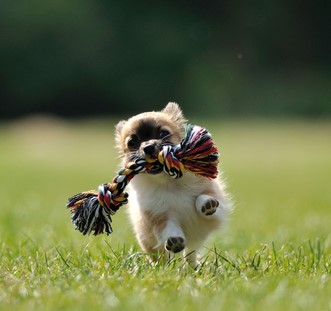What do you need to know when the parvo puppy goes home?
Medications
Puppy running with rope toy

Your puppy may be finishing a course of antibiotics and may also be on medication for nausea or diarrhea. It is important that you give your puppy all of the medication for the full amount of time it has been prescribed.
Diet
Exercise
Your puppy should be considered contagious to other puppies for a good month so it is important to play it safe by restricting trips to the park, obedience school, or other neighborhood areas. If your puppy is less than 16 weeks of age, they should not be allowed in public areas until the vaccination series is fully completed. Your puppy can be considered immune to parvovirus but there are many other infectious diseases that your puppy needs to be vaccinated against.
Other Pets
Humans are not susceptible to canine parvovirus infection though some strains can be contagious to cats. (Feline distemper vaccination is protective to cats as feline distemper is a parvovirus.) Adult dogs who are current on their parvo vaccinations are not susceptible to infection. If an adult dog at home is not current, a booster shot is definitely in order. Introducing new puppies poses a problem as the parvovirus persists for a long time in the environment; if possible, only puppies that have completed their vaccination series should be introduced. Any obviously contaminated material should be removed (fecal- or vomit-contaminated objects that cannot be bleached, any remaining areas of feces, etc.) For more details, learn about disinfecting the environment.
Bathing
Your puppy may be bathed at any time as long as you do not allow her to get cold or chilled after the bath. Bathing will reduce the amount of virus left on her fur and will help reduce contagion.
Resuming Vaccines
Follow your veterinarian's recommendations. Your puppy cannot be re-infected with this virus for at least 3 years (and probably is protected for life simply by virtue of this infection) but there are other viruses that your puppy should be protected against. Your veterinarian will give you a vaccination schedule for the future.
There should be no permanent ramifications due to this infection. The recovered puppy should lead a normal life once the recovery period is completed (1-2 weeks). If you have any questions about your puppy's care after discharge, contact your veterinarian.